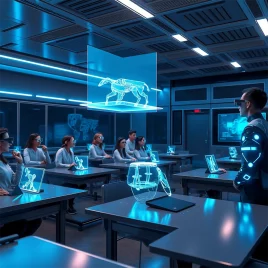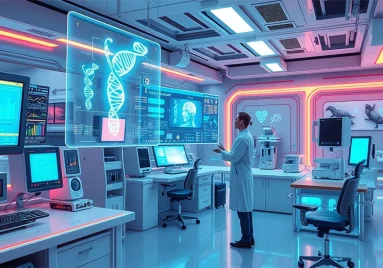In recent years, artificial intelligence (AI) has revolutionized numerous industries, and healthcare is no exception. One of the most exciting applications of AI in healthcare is in drug discovery. AI-driven drug discovery is transforming the pharmaceutical landscape by accelerating research, reducing costs, and improving the efficiency of drug development. But how exactly does AI achieve this? Let’s dive deeper.
The Traditional Drug Discovery Process
Drug discovery is a complex, time-consuming, and expensive process that involves several stages:
- Target Identification – Finding a biological target linked to a disease.
- Drug Screening – Identifying compounds that can interact with the target.
- Preclinical Testing – Evaluating drug safety and effectiveness in lab conditions.
- Clinical Trials – Testing on humans in multiple phases.
- Regulatory Approval – Gaining approval from agencies like the FDA.
Challenges in Traditional Drug Discovery
- Time-consuming: It takes 10-15 years for a drug to reach the market.
- Expensive: Costs can exceed $2.6 billion per drug.
- High failure rates: Over 90% of drugs fail in clinical trials.
How AI is Transforming Drug Discovery
AI is significantly improving drug discovery by:
- Speeding up research: AI algorithms analyze vast datasets quickly, identifying drug candidates faster.
- Reducing costs: AI reduces the need for extensive laboratory testing by predicting results in silico.
- Improving accuracy: AI enhances drug target identification and prediction of drug interactions.
Key Technologies Behind AI-Driven Drug Discovery
Machine Learning and Deep Learning
AI models analyze patterns in biological and chemical data to predict drug behavior.
Natural Language Processing (NLP)
NLP helps analyze vast amounts of scientific literature, patents, and clinical trial data.
Predictive Analytics
AI predicts how a drug will react in the human body, reducing the need for early-stage testing.
Quantum Computing
Quantum computing enhances AI capabilities, making drug discovery even faster and more accurate.
Applications of AI in Drug Discovery
Identifying New Drug Candidates
AI can scan millions of compounds to find potential drug candidates much faster than traditional methods.
Drug Repurposing
AI helps find new uses for existing drugs, saving time and resources.
Personalized Medicine
AI tailors drug development based on individual genetic profiles, improving treatment effectiveness.
Enhancing Clinical Trials
AI optimizes patient selection and trial design, reducing time and costs.
Case Studies: AI in Action
AI Discovers a New Antibiotic
Researchers at MIT used AI to discover Halicin, a powerful antibiotic capable of killing drug-resistant bacteria.
AI and COVID-19 Drug Development
AI helped identify potential treatments for COVID-19, speeding up the research process during the pandemic.
Advantages of AI in Drug Discovery
- Faster and more efficient drug development
- Lower research and development costs
- Improved drug safety and efficacy predictions
Challenges and Limitations of AI in Drug Discovery
Despite its advantages, AI faces several hurdles:
- Data Quality: AI requires vast, high-quality datasets, which are not always available.
- Regulatory and Ethical Issues: AI-driven drug discovery must meet strict regulatory standards.
- Interpretability: AI models must provide transparent and explainable predictions.
The Future of AI in Drug Discovery
The future of AI in drug discovery is bright, with potential advancements in:
- Precision Medicine: AI will enable personalized treatments based on genetic data.
- Integration with Other Technologies: AI will work alongside CRISPR, nanotechnology, and robotics.
- Preventive Healthcare: AI will help identify disease risks before they develop.
Conclusion
AI is revolutionizing drug discovery, making it faster, more efficient, and cost-effective. While challenges remain, ongoing advancements in AI technology will continue to shape the future of medicine, ultimately leading to better healthcare solutions for all.
FAQs
1. How does AI help in drug discovery?
AI analyzes large datasets to identify potential drug candidates faster and more accurately.
2. Can AI replace human researchers in pharmaceutical research?
AI assists researchers but cannot fully replace human expertise and decision-making.
3. What are the biggest challenges in AI-driven drug discovery?
Data quality, regulatory approvals, and AI model transparency are major challenges.
4. How is AI used in clinical trials?
AI optimizes patient selection, trial design, and data analysis, reducing trial duration and costs.
5. What is the future of AI in medicine?
AI will advance personalized medicine, drug repurposing, and disease prevention.
Please don’t forget to leave a review.






